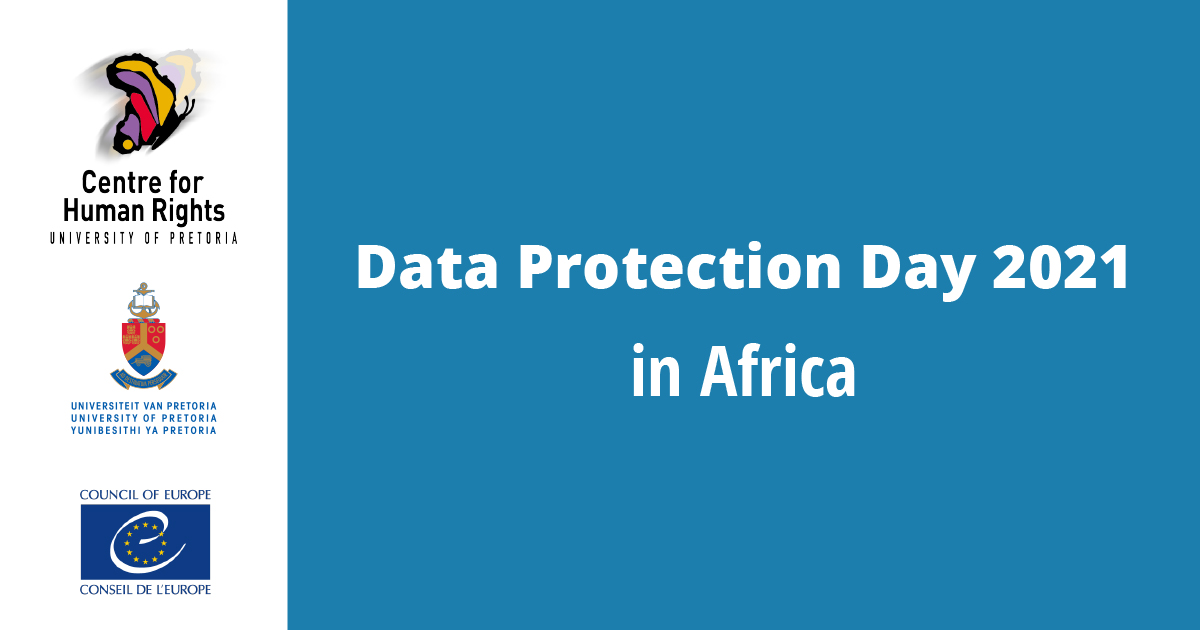The Centre for Human Rights, University of Pretoria, joins the commemoration of Data Protection Day, celebrated worldwide on 28 January. This year, it is the 40th anniversary of the Convention for the Protection of Individuals with regard to Automatic Processing of Personal Data, also known as Convention 108. On 28 January 1981, the treaty opened for signature by the member states and for accession by non-member states. To date, it has been signed by close to forty countries including five African countries. The Convention has global applicability, as it is the only treaty on data protection that is open to any country in the world. Its principles have been transposed in national, regional and sub-regional data protection frameworks.
Today, many countries are rapidly embracing digital transformations with various implications for social, economic and political developments. As a result, the right to privacy is gaining more significance in the digital age. This development has given a new imperative for African states — to comply with international and regional standards on personal and non-personal data protection policies.
The Centre acknowledges the ongoing continental and sub-regional efforts to guarantee the right to privacy and data protection. The African Union (AU) adopted the Convention on Cyber Security and Personal Data Protection, also known as the Malabo Convention in 2014. In addition to the Convention, the AU, together with the Internet Society (ISOC) developed and launched the Personal Data Protection Guidelines for Africa. The African Charter on the Rights and Welfare of the Child (ACRWC) provides for the right to privacy. Although the African Charter on Human and Peoples’ Rights does not explicitly recognise the right to privacy, the African Commission on Human and Peoples’ Rights also adopted the Declaration of Principles on Freedom of Expression and Access to Information in Africa in 2019. Principles 40 - 42 of the Declaration provides principles on the right to privacy and data protection, including the need for African States to ‘adopt laws for the protection of personal information of individuals in accordance with international human rights law and standards’. Some of the benchmarks for processing personal information set out in the Declaration include consent of the individual concerned; confidentiality and security of information; lawfulness and fairness; clearly stated purpose of collecting information; transparency; and ensuring that personal information is accurate and updated.
At the sub-regional level, the Southern African Development Committee (SADC) adopted a Model Law on Data Protection, the Economic Community of West African States (ECOWAS) has a Supplementary Act on Personal Data Protection and the East African Community (EAC) has a Frameworks for Cyber Laws which includes provisions on data protection and privacy. A number of African countries have adopted the data protection legislation while some are at different stages of adoption and a number still do not have specific data protection legislation but privacy and data protection provisions in other laws.
On this day, the Centre implores relevant stakeholders such as internet service providers, gender justice advocates, children’s rights activists, the business sector, consumer protection organisations, political parties, electoral management bodies, legislators, national human rights institutions, the judiciary, law enforcement agencies, policymakers and data protection authorities to actively promote data protection through various ways that are applicable to their work. The Centre also calls on African states to adopt data protection legislation to give effect to the right to privacy, which is a fundamental right. Finally, the Centre calls on states to ensure that all legislation meant to address the challenges encountered in the digital sphere, such as cybersecurity and cybercrime laws, respect the right to privacy.
On 28 January 2021, the Centre in collaboration with the Council of Europe hosted an online event to commemorate Data Protection Day 2021.
For more information, please contact:

Tel: +27 (0) 12 420 4199
Fax: +27 (0) 86 580 5743
Hlengiwe.Dube@up.ac.za


